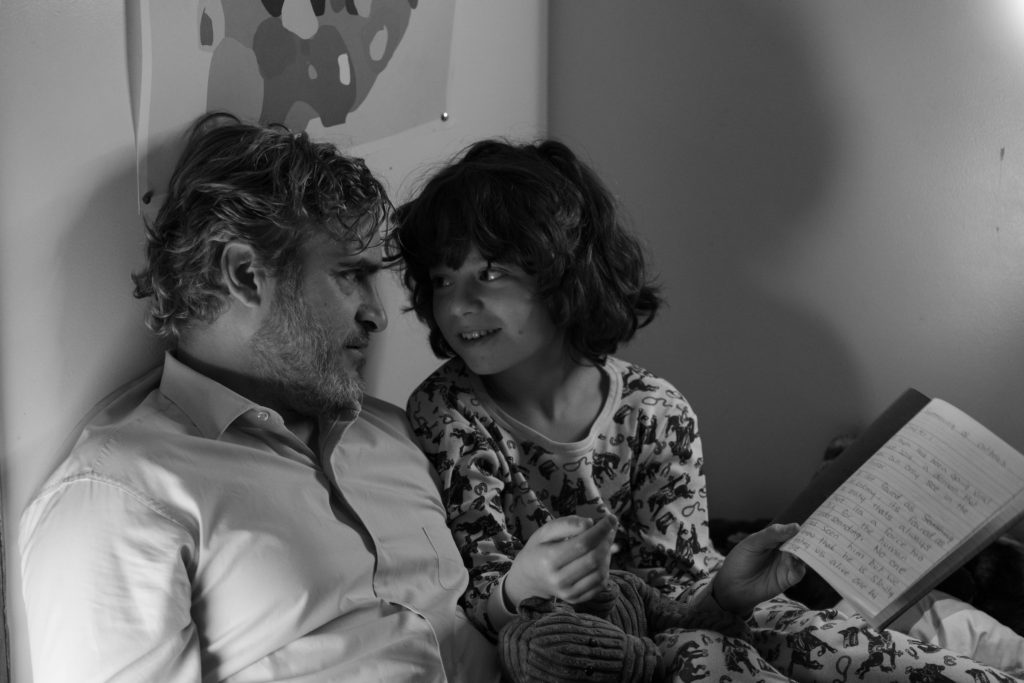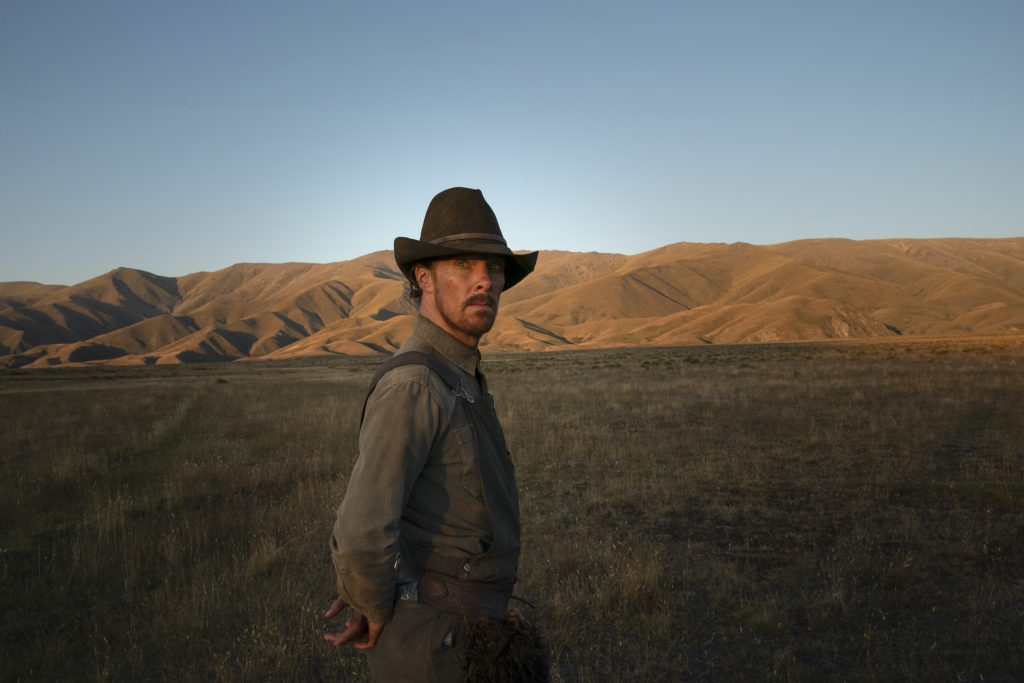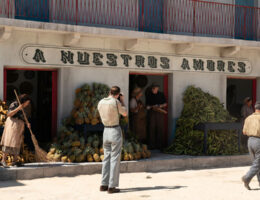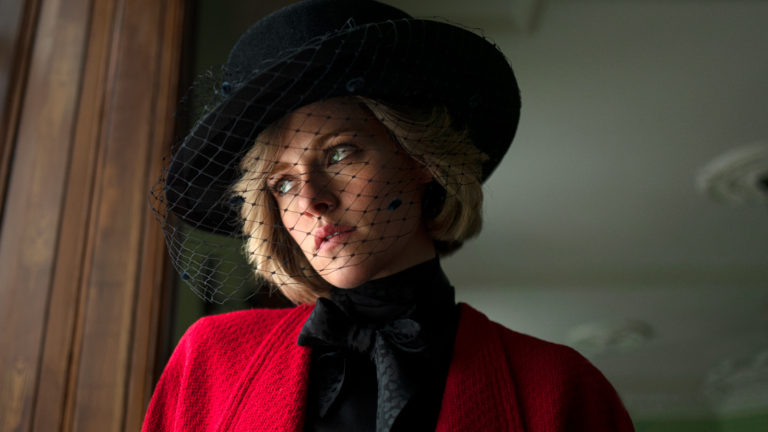The title card calls Spencer a “haunted fable inspired by a true life tragedy”, but director Pablo Larraín films it like a straight-up psychological horror movie. It’s all low angles, alienating empty spaces, and a conspicuous number of dead pheasants. Set over the Christmas holiday with the Royals, the three-day span at Sandringham is bathed in perpetual fog, literal and mental, and there are ghosts all around.
We first meet Kristin Stewart in her command performance as Princess Diana oddly lost on the country roads surrounding both her own childhood home and the royal manor. Incongruously, she’s driving herself in her convertible Porsche to a dreaded uptight family gathering mired in staunch traditions. At this point, her marriage to Prince Charles is drawing its last gasps and the constant glare of the press and the palace minders have made shreds of her sanity.
Stewart’s portrayal of the princess is anything but subtle, but her ability to look phenomenal in clothing makes her the perfect muse for this fashion plate fantasia. She’s all crooked shoulders, indirect gazes, and twitchy mannerisms. Emphasizing Diana’s crippling bulimia, the film sets a simple soup course to Jonny Greenwood’s unnerving and oppressive jazz score and turns it into a nightmare of body horror and beautiful gowns sprawled across lavatory tiles. Elsewhere, drawing sharp contrasts, Larraín cuts to the team of dedicated chefs who prepare, with military precision, elaborate meals that they hope will please the princess. She regurgitates them tragically into toilet bowls with upsetting regularity.
Although Larraín’s sympathies are certainly with her, his depiction of Diana in crisis is not entirely sympathetic. She’s perpetually late to everything, both as inability to resist self-sabotage and as small acts of rebellion against the family’s oppressive attempts at control. She behaves oddly and increasingly resists family customs. You can see why the Windsors’ patience with this erratic publicly adored in-law has reached its limits.
Most of Diana’s complaints against the family are implied or occur offscreen; so she spends much of her screen time reactive and alone, further enhancing the unreliability of the narration as her breaks with reality intensify. Timothy Spall’s ghoulish Major Gregory, brought in to monitor her behavior, is always lurking. A beloved confidant/dresser played by Sally Hawkins is unceremoniously taken away from her, limiting any moments of healthy companionship. One of the few direct interactions comes in the form of an absolutely gutting conversation across a billiards table with Charles in which he coldly outlines the grim state of their relationship and their differing approaches to the life-draining responsibilities of modern royalty.
Stewart allows some light to return to her eyes during the rare moments that Diana spends with her sons, but even here she conveys a such sense of desperation to escape that it’s clear that her unspooling state is placing an heavy and undue burden on her beloved boys. As tensions peak, we see Diana tromping around the dewy grounds at night, exploring decaying mansions, seeing visions of Anne Boleyn, and weighing the value of her life through fashion montages. We all know there’s no happily ever after to this dark tale, but as it culminates with a declaration of love, a cheeky confrontation, a fantasy escape sequence, and what seems like a small imagined reclamation of agency, you can’t begrudge Larraín’s for trying to give her one.

Late in C’mon C’mon one character asks another: “Are you laughing or are you crying? I can’t tell.” As is the case with most of his filmography, viewers of Mike Mills’s brilliant new film would almost definitely answer with a very enthusiastic “both”.
In it, Joaquin Phoenix plays Johnny, a public radio journalist who is touring the country to interview kids about their thoughts on the future. Middle aged, single, and maybe a little emotionally reserved, his sister (Gaby Hoffmann) reluctantly enlists him to watch his ten-year-old nephew Jesse (a phenomenal Woody Norman) while she leaves to help her unstable ex (Jesse’s father) with an emerging personal crisis. What begins as a long weekend of unprepared babysitting in Los Angeles eventually develops into weeks of on-the-job training in surrogate parenthood and shaky personal growth as Johnny winds up taking Jesse with him back to New York and later on the road to New Orleans to tag along while he completes his project.
Shot in luminous black-and-white, which Mills described as a gesture toward creating a myth and evoking the crisp lines of a drawing, the film marks a long-overdue opportunity for Phoenix to show his softer, shaggier side. His rapport with Jesse — adoring, anxious, and frustrated — is palpable and their developing onscreen relationship is utterly affecting to watch. In his typical style of “heterogeneous filmmaking”, Mills incorporates the interviews with real children whose comments about themselves and their predictions are authentic, cautionary, and enlightening. As the main plot moves forward, phone calls, text messages, and flashbacks between siblings reveal the complicated familial landscape that resulted in their currently distant relationship. Also woven throughout the movie are direct quotes from essays and readings of heart-tugging children’s stories.
In anyone else’s hands, all of these threads could quickly become a tangled trying-too-hard mess. But Mills allows them to each to run their complementary courses, and the cumulative effect creates tingling electric resonances that are much more than the sum of their parts. It’s an astonishingly affecting gestalt about the ways that people take care of each other all the time. By the end, we’re so invested in Jesse and Johnny that a few notes of encouragement and a promise for the future had almost everyone crying into their face masks.

My evening concluded with a well-deserved tribute to Jane Campion, followed by a screening of her twisty new Western, the Power of the Dog. In this simmering exploration of cruelty, duty, and revenge she remarkably finds surprising ways to uncover new ideas in classic archetypes of masculinity. Filmed against a stunning New Zealand landscape that stands in for 1900s Montana, the film showcases Campion’s remarkable grasp of both the grand sweep of natural beauty as well as a keen attention to the insightful details of places and personalities.
As half of a central pair of old money brothers, Benedict Cumberbatch’s Phil Burbank is the perpetually scowling, relentlessly cruel older sibling who has spent the last quarter century running his parents’ ranch and leading the annual cattle drive alongside the softer, more upstanding George (Jesse Plemmons, who brings a sense of faded longing for a less disappointing existence). Phil is the widely-admired alpha in leather chaps and workwear to their coterie of cattlehands, who all curry for his favor and magnify his insults to any perceived weakness in their midst. The brothers’ comfortable squabbling, if yin-yang relationship, is thrown out of balance when the kinder brother strikes up a relationship with Rose, a widowed innkeeper played with steadfast sincerity by his real life partner, Kirsten Dunst.
Their marriage marks a moment of happiness for both lonesome souls, but it can’t last under Phil’s ever-spiteful glare. Rose soon begins to wither into tragic anxiety and renewed alcoholism upon moving into the family’s house. When her sensitive and scholarly son Peter (Kodi Smit-McPhee, embodying the misfit son with quiet oddity) arrives for a summer on the ranch he’s an immediate outlier, complete with stiff blue jeans, an oversized hat, and crisp white athletic trainers in place of cowboy boots. An immediate target for Phil’s harassment, the clever teen slowly gains some curious respect from the spiteful rancher by showing a clumsy openness to learning the skills of the frontier and keen perceptiveness about the ranch’s power dynamics. Their relationship develops via a delicate if dangerously uncertain dance that reveals, in fits and starts, the source of Phil’s bitterness and sets up a suspenseful final act.
Here, Cumberbatch finds space to to develop a character that initially threatened to be a single unpleasantly dark note, granting what might have been an overly-mannered character a layered portrayal and hidden depths. With Phil’s ever-present penchant for menace looming, his intentions for the teen remain opaque and the trajectory of their interactions unsettling uncertain. Campion, however, exhibits a mastery of control navigating the simmering suspense with exceptional dexterity to a sharp, surprising, and revelatory conclusion.
I had my doubts at the beginning of the film, but by the end I was completely sold.
Header image from Spencer, courtesy Neon.




